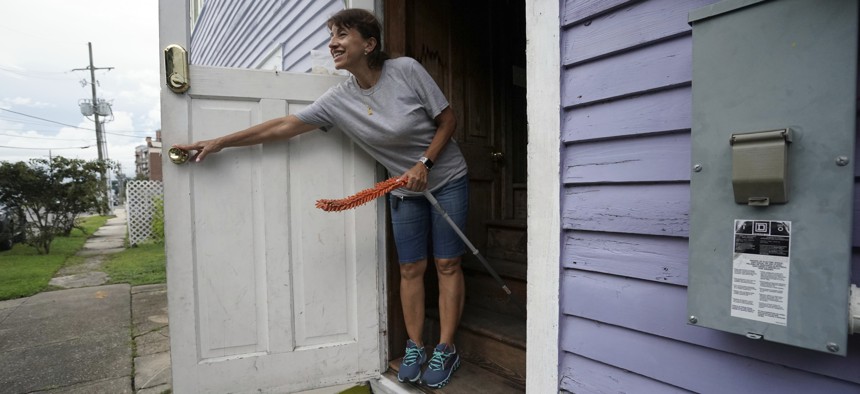Airbnb Still Isn’t Collecting Local Taxes Everywhere

An Airbnb rental in New Orleans. The company collects city taxes and fees in New Orleans, but not in all Louisiana jurisdictions, according to its website. AP Photo
While the company has stepped up collection efforts in recent years, a new report argues that local lawmakers should ensure Airbnb collects all lodging taxes.
More and more, when booking to stay in a house or apartment through Airbnb, a visitor will be charged a local or state tax, just like when staying at a hotel.
But this collection effort by the popular online hosting company isn’t universal. A new report that weighs the economic benefits and costs associated with short-term rentals through Airbnb argues it should be, saying local governments should insist that the tax regimes—and other regulations—are the same as for the hotels they compete with.
“If the lodging tax in a city is X percent, Airbnb should have to pay that full amount in a transparent way,” said Josh Bivens, research director at the Economic Policy Institute, in an email. “And if a building is zoned for residential units and not short-term travel accommodations, then Airbnb shouldn’t be allowed to offer full-apartment rentals in it.”
When the Institute on Taxation and Economic Policy looked at the issue in 2017, the group found that Airbnb was collecting state and local taxes in 26 states and the District of Columbia on behalf of its hosts. Now that number is at 43 states, according to the company’s website. But efforts are uneven when it comes to local “bed” or “lodging” taxes, which are often collected as part of agreements Airbnb has with jurisdictions.
A company spokesperson said Airbnb is willing to work with municipalities on the issue.
“Hotel and tourist tax rules were designed for big corporations with teams of lawyers and accountants, not regular people sharing their homes on platforms like Airbnb, and so we have worked with more than 500 governments globally to establish voluntary tax collection agreements to simplify this process,” said Molly Weedn, an Airbnb spokesperson, in a statement. “To date, we have collected and remitted more than $1 billion in hotel tax revenue and are eager to work with any government willing to work with us on this front.”
In Florida this week Airbnb reported that last year it collected $90 million in taxes, including sending $27 million to 40 of the state’s 67 counties. Overall tax collections in the state doubled from 2017 to 2018.
The company attributed the increase to more tourism in general, the Tampa Bay Times reported. “Since hotels are doing great as well, it seems that simply more people are traveling to the region, staying longer and spending more,” spokesman Ben Breit told the paper in a statement.
But taxes weren’t collected everywhere, including in tourism-centric Palm Beach County, which has been locked in litigation with Airbnb and other hosting companies, according to the South Florida Sun Sentinel.
In places where no agreement is in place, individual hosts are often responsible for collecting bed taxes and paying them to local officials, which frequently means they don’t get paid. An analysis by the news outlet Rivard Report in San Antonio, Texas last fall concluded that only 14 percent of short-term rental owners in the city were paying hotel taxes (which had to be paid in person or by phone).
In New Mexico, state lawmakers are considering legislation that would require Airbnb to collect and remit local taxes for several municipalities—like Silver City, Las Cruces and Truth or Consequences—that don’t have agreements with the company. The state currently has an exemption in the law that doesn’t always require collection of a lodging tax if only a room or two is rented out, the Santa Fe New Mexican reported.
“It should be the default that tax is collected on these stays. But that is not the way it has worked out,” Carl Davis, research director at ITEP, told Route Fifty. “We have seen the process dragged out in a lot of states.”
Collecting taxes “is a way to ensure that visitors in your community are paying something to support local infrastructure and services,” Davis added.
Davis said that it seems a lot of the agreements get worked out as local governments consider other regulations involving aspects of short-term rentals, such as if a town or city bans full-house rentals or imposes time restrictions on how often a property can be rented. This often come up when questions are raised about short-term rentals squeezing out permanent residents.
But Davis advised that governments work out tax issues and other regulations with Airbnb separately.
"It is floated as a carrot when it should be a baseline expectation," he said.
The liberal-leaning Economic Policy Institute study examined the costs of Airbnb, like fewer affordable rentals, against the economic gains for hosts and local economies from increased tourism. The report, which analyzed previous papers on the industry, concluded the potential economic growth wasn’t enough not to insist on full collection of all potential taxes and compliance with other local regulations like zoning restrictions.
The paper cites two studies funded by the hotel industry that Airbnb has criticized, including one that found a growth in hosts who own and rent out many properties, saying they are essentially acting as mini-hotel companies instead of owners renting out a spare room.
Another study from 2017 critiqued the agreements Airbnb had worked out with local governments, arguing they aren’t transparent and don’t guarantee proper collection of taxes. In responding to that evaluation, Airbnb said that the company is trying to work with local communities.
Laura Maggi is Managing Editor of Route Fifty and is based in Washington, D.C.
NEXT STORY: How a Ballot Initiative to Expand Medicaid in Utah May Be Denied






